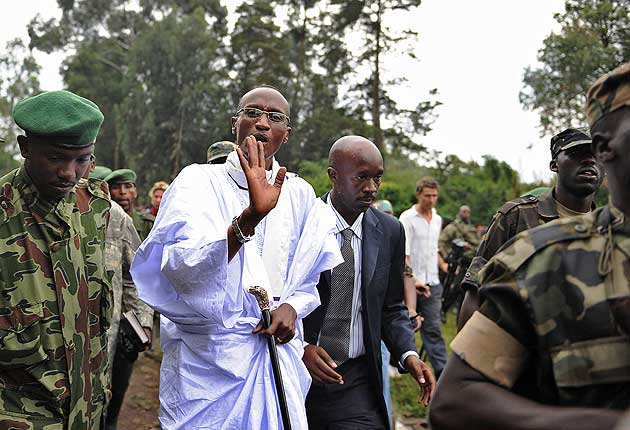Tutsi commander faces war crimes trial

The renegade general Laurent Nkunda whose forces sparked an international crisis late last year in Eastern Congo was last night facing extradition to Congo and a possible war crimes trial.
In a startling reversal of fortune, the feared Tutsi rebel commander was arrested in Rwanda by forces who until last week were thought to be his main allies in the region. He was detained after his Tutsi CNDP rebels resisted a joint offensive by Rwandan and Congolese forces on Thursday night and the general allegedly fled across the border.
His arrest was confirmed yesterday by UN officials, and through a statement by the Congolese and Rwandan armies.
Gen. Nkunda has suddenly found himself on the wrong side of a fundamental shift in the relations between the Democratic Republic of Congo and Rwanda. The long-time enemies struck a deal last week – the precise terms of which are unknown even to the UN – which cleared the way for 4,000 Rwandan troops to enter the DRC. Their stated aim was to hunt down the remnants of the Hutu genocidaire, thought to number 6,000 fighters. But their troops have moved instead against Gen. Nkunda's fellow Tutsis, the CNDP.
The news of his capture was greeted with joy in Kinshasa and Goma where there had been the first signs of dissent over the deal to allow foreign troops into the DRC.
A spokesman for Congolese president Joseph Kabila said the government would seek Gen. Nkunda's extradition to face charges of treason and crimes against humanity.
The turnaround has taken Nkunda loyalists by complete surprise and officials at CNDP headquarters in Eastern Congo, contacted by satellite phone, initially denied he had been captured.
“The media is making this up,” said CNDP spokesman Capt. Ngenzi. “The general has not been captured.”
Within hours the general's senior aide, Bertrand Bisimwa confirmed the general had been arrested.
Only two months ago the former psychology student had been the lord of a vast new realm carved out by his forces in North Kivu. A lightning offensive by the CNDP in late October had routed government forces and taken Gen Nkunda's fighters to the outskirts of Goma – the regional capital, UN headquarters, and centre of international aid operations. A quarter of a million people were displaced in the advance, sparking a humanitarian crisis and focusing international attention on Eastern Congo. The rebel commander then appears to have overreached by abandoning his aim to defend ethnic Tutsis and threatening to advance all the way to Kinshasa and install a new “better” government.
In an interview with The Independent on 22 November at a political rally in the capital of his new domain, Rutshuru, the general hinted that he might one day become president of the DRC.
However, international pressure on Rwanda – whom the UN has accused of backing Gen. Nkunda with weapons and money – appears to have pushed Kigali into changing course. The impoverished mountain nation is dependent on international aid, with the UK its largest single donor.
Meanwhile, the democratically Kabila government in Kinshasa, beset by more than a dozen rebel armies operating in its vast interior has also changed tack. The DRC has given a green light to regional governments to enter its territory and hunt down rebel groups. In quick succession Southern Sudan and Uganda have crossed the border to attack the brutal Lords Resistance Army in northern Congo and now Rwandan forces have moved against the CNDP and Hutu militias, known as the FDLR, in the east.
"It's pretty obvious by now that this is part of the deal between Kigali and Kinshasa to tackle both the FDLR and CNDP at the same time," said independent Congo analyst Jason Stearns.
The development marks a particular betrayal for Gen. Nkunda himself. A Congolese Tutsi from Rutshuru he fled to Uganda in 1990s where he joined the Tutsi Rwandan Patriotic Front which in 1994 invaded Rwanda to end the genocide there. He continued to serve in a Rwandan-backed militia during the 1998-2003 Congo war, afterwards taking a post with the Congolese national army. A year later he quit the army to launch the CNDP rebellion, claiming that Tutsis needed protection from Hutu remnants now calling themselves the FDLR.
Last night crowds had gathered in Goma at the border crossing into Rwanda after rumours that Gen Nkunda was to be handed over.
A tall, thin man who is never seen without a black cane topped with a silver eagle, the general was reportedly left with only three loyal battalions when he was captured in Rwanda after losing support in the CNDP. However, loyalists claim that he had not fled across the border but had instead been lured “for consultations” with his erstwhile allies and fellow Tutsis. The two countries have no extradition treaty but analysts predicted that a US drafted agreement would quickly be concluded to facilitate a handover of the general.
Subscribe to Independent Premium to bookmark this article
Want to bookmark your favourite articles and stories to read or reference later? Start your Independent Premium subscription today.

Join our commenting forum
Join thought-provoking conversations, follow other Independent readers and see their replies
Comments